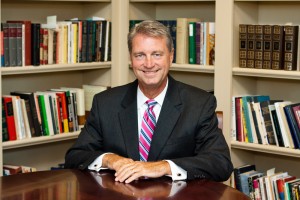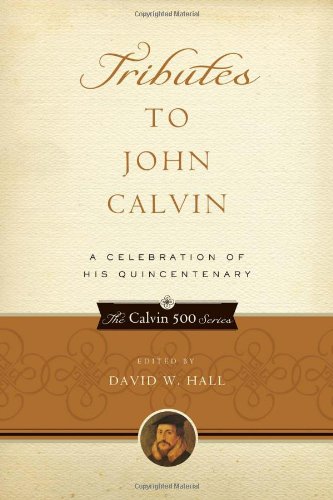Welcome again to Books At a Glance! I’m Fred Zaspel, and we’re continuing our discussions on the Protestant Reformation. Today we begin talking about John Calvin’s influence in various dimensions. Dr. David Hall is a specialist in Calvin studies, and he’s with us again today.
David, where and what did Calvin teach about business, economics, and finance?
David Hall:
Sure, and thanks again for having me. The whole area of commerce, which I use as shorthand for business economics and finance. Calvin, of course, never wrote an economic treatise, nor was he a financial advisor, nor did he own a private business, but he certainly expounded the Scriptures, and that’s where we find his teaching about these very important subjects. In fact, there are some areas where Calvin is more welcome because of his teaching on commerce and business then it would his theology.
Where did he teach about that? Well, I tell people to begin at the beginning in the book of Genesis. Calvin has some wonderful exegesis when he discusses the Garden. He says that man was born rich, that’s a nice phrase to remember, and that there was an extravagant excess of riches in the Garden. So Calvin’s teaching on commerce and business begins at creation and he sees wealth as created. Wealth was a tool that was not inherently evil. And then he goes on in several other key places.
If a student or a researcher wants to study Calvin’s view on this, besides the early chapters in Genesis, I would refer people to Calvin’s commentaries on the 10 Commandments. Three of those in chief, well actually, four talk about matters of business. The fourth commandment on the Sabbath. It might surprise people, because people would think that that’s a time to take off, but Calvin actually expounded the fourth commandment, as did his descendants, and said, not only do we take one day in seven off, but we actually are to work six days. So there’s a positive command to work on the first six days of the week.
And then on the eighth commandment, you shall not steal. Calvin commented on that, and said that requires us positively to have a job, a vocation. That was a transformative movement in Calvin’s thinking. Heretofore, the only sacred calling was to be a clergyman. And Calvin and other reformers helped show that there were many callings in life, and not just to be a minister. One could be a banker, a businessman, a farmer or lawyer or what have you, and still do that to the glory of God.
Then if you want to go to the New Testament, Calvin has some very salient comments on wealth and warning us against it. Particularly in the Gospels, I think of Matthew, chapter 6. And then on 1 Timothy 6, Calvin has some wonderfully refreshing quotes on the dangers of wealth and how we should take that seriously and avoid being seduced by that.
Let me summarize it this way – three things. Wealth is not inherently evil, it’s a tool. Secondly, and this shouldn’t be a surprise, Calvin did not teach a socialist view of classlessness. He didn’t believe that all people are going to be equal and that all employments would lead to equal wages. Instead, Calvin taught that there’s a Providence that God works out in our world, and some will be wealthy and someone not; and each of those have their own inherent temptations. Calvin said whatever state God gives us is something we should praise him for. And then the third thing that Calvin did, and I probably shouldn’t get into too much detail on this, but briefly, he reformed what we would call interest laws. He reformed the usury standard which, from the Old Testament, said you shouldn’t charge interest to your brother. In short, Calvin was an early representative of what our mothers probably told us, or at least our fathers, that there is no free lunch. Somebody has to pay for it somewhere. So, if a wealthy person, for example, borrowed a sum and was charged no interest, that wealthy person would put that money to work in the market and make money and someone else would lose. Calvin saw that that was not a fair standard and that human depravity would take advantage of that at every opportunity. So, there was a change in the usury standards; and the monetary supply increased and was unleashed in the rest of the world, leading to a real economic revolution and transformation that Max Weber and others sought to comment on.
Zaspel:
Give us those three areas of emphasis again.
Hall:
I think the three contributions Calvin made were first, that wealth is not inherently evil, but it’s a tool. Secondly, he was not an advocate of classlessness, but of Providence. And thirdly, he reformed the usury standards and how businesses could legitimately charge interest because capital was a tool; and under stewardship all tools should be put to work in the market. But he also cautioned against depravity playing the system, gaming the system, if you will, and making money which would be a form of theft, which is a violation of the eighth commandment.
Zaspel:
Does Calvin view wealth as good? Or bad? Or as Max Weber?
Hall:
Well, Weber’s classic work in 1905 is a standard sociological study and many college freshmen will study that classic work that he authored, The Protestant Ethic in the Spirit of Capitalism. But Calvin actually had a different view. Calvin thought that every day we go to work. And he even wrote this wonderful prayer that I like to tell people to go research. In the 1562 Genevan Catechism, there was a prayer that Calvin authored that people were to pray at their breakfast tables before they went to work that, rather than being materialistic, which is what Weber interprets Calvin to be, they prayed to God realizing that nothing goes well without him. And they prayed and asked God to keep them from fraud and deception or anything that would make our appetite to become wealthy lead us into error. That is part of the true spirit of Protestantism, which is a correction that Weber didn’t seem to understand.
Zaspel:
Next time Dr. Hall will talk to us about the preaching of John Calvin. Thanks for joining us here on Books At a Glance.
Editor’s Note: Here are some related resources from Dr. David Hall
Tributes to John Calvin: A Celebration of His Quincentenary
wtsbooks
Amazon
Lectures on Integrity: A Review of Confessional Subscription as an Aid for Orthodoxy and Orthopraxy
Amazon
Post Tenebrae: Essays on Calvin and Calvinism
Amazon
The Genevan Reformation and the American Founding
Amazon
To Glorify and Enjoy God: A Commemoration of the 350th Anniversary of the Westminister Assembly (co-author with John L. Carson)
wtsbooks
Amazon
The Legacy of John Calvin (2008)
wtsbooks
Amazon
Calvin and Commerce: The Transforming Power of Calvinism in Market Economies (2009)
wtsbooks
Amazon
Preaching Like Calvin: Sermons from the 500th Anniversary Celebration (2010)
Amazon
Calvin in the Public Square: Liberal Democracies, Rights and Civil Liberties (2009)
wtsbooks
Amazon
Essays in Calvin and Calvinism (kindle editions, 2014-2015)
Volume 1
Volume 2
Volume 3
A Theological Guide to Calvin’s Institutes: Essays and Analysis (2008, 2015) (with Peter Lillback)
wtsbooks
Amazon
Calvin and Culture: Exploring a Worldview (2010) (with Marvin Padgett)
wtsbooks
Amazon

